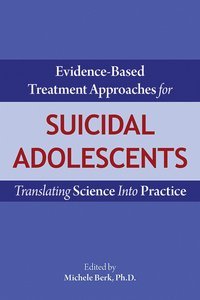Diagnostic Issues in Depression and Generalized Anxiety Disorder
Refining the Research Agenda for DSM-V
View Pricing
Description
Generalized anxiety disorder (GAD) and major depression (MD) form the largest group of common mental disorders. These two conditions often occur together, and emerging evidence suggests several similarities between them. As we move toward revising the Diagnostic and Statistical Manual of Mental Disorders for DSM-V, Diagnostic Issues in Depression and Generalized Anxiety Disorder: Refining the Research Agenda for DSM-V explores the nosologic relationship between GAD and MD. In this comprehensive manual, more than 45 contributors cover a wide range of empirical and conceptual issues that face clinicians and researchers working with GAD and MD today.
This book acts as a guidepost for the entire DSM process. It reviews recent scientific advances in our understanding of the interrelationship between GAD and MD, summarizes the body of evidence into a few broad conclusions, and reflects on the implications of these findings for future nosologic efforts. The contributing authors review empirical data from a variety of perspectives—including genetics, biology, treatment, development, course, predictors, disability, and psychosocial stressors—and then integrate results from research on all these diverse validators to come up with a single bottom-line recommendation regarding the relationship between GAD and MD. In addition, the book considers conceptual issues, such as criteria for results from validators, the relevance of results on symptoms of anxiety and depression, weights of different classes of validators, and the rules for assigning disorders into categories. And finally, it addresses the question of what new kinds of data could be gathered that would help to clarify the relationship between MD and GAD more definitively. Each chapter includes tables, charts, and references to enhance the evidence presented on such diverse topics as:
- A thorough review of the genetics of GAD and MD
- The role of psychotropics in distinguishing between GAD and MD
- Biological and treatment aspects of GAD and MD
- Psychometric aspects of GAD and MD
- Childhood risk factors associated with GAD and MD
- Common mental disorders across cultures
Diagnostic Issues in Depression and Generalized Anxiety Disorder: Refining the Research Agenda for DSM-V develops operationalized criteria for nosologic decisions that enable clinicians to bridge the gap between data to diagnostic recommendations. Not only does the methodology of investigating an active interchange between empirical and conceptual perspectives shed new light on the relationship between GAD and MD, but it also carries implications for the rest of DSM-V.
Contents
- Preface. The problem: charge to the conference. The nosologic relationship between generalized anxiety disorder and major depression. Commentary on the nosologic relationship between generalized anxiety disorder and major depression. The biology of generalized anxiety disorder and major depressive disorder: commonalities and distinguishing features. What (no) differences in responses to three classes of psychotropics can teach us about distinctions between generalized anxiety disorders and major depressive disorder. Commentary on the biology of GAD and MAD and what (no) differences in responses to three classes of psychotropics can teach us about distinctions between GAD and MDD. Psychometric aspects of anxiety and depression. Commentary on psychometric aspects of anxiety and depression. The boundary between generalized anxiety disorder and the unipolar mood disorders: diagnostic and psychometric findings in clinical samples. Major depression and generalized anxiety disorders in the national comorbidity survey follow-up survey. The relationship of generalized anxiety disorder and major depression over time. Generalized anxiety disorder and major depression: common and reciprocal causes. Confirmatory factor analysis of common mental disorders across cultures. Commentary on confirmatory factor analysis of common mental disorders across cultures. Generalized anxiety disorder and depression: childhood risk factors in a birth cohort followed to age 32 years. Are there early adverse exposures that differentiate depression and anxiety risk? Episodes and disorders of general anxiety and depression. Are major depression and generalized anxiety disorder the same or different disorders? Discussion of the Dunedin and Medical Research Council birth cohort studies and the three generation high risk study. Toward a primary-care friendly DSM-V classification of emotional disorders: an integrative approach. Psychosocial origins of depressive and anxiety disorders. Commentaries on psychosocial origins of depressive and anxiety disorders, part 1. Commentaries on psychosocial origins of depressive and anxiety disorders, part 2. The relationship between generalized anxiety disorder and major depressive episode. Index.
Contributors
- Vladeta Ajdacic, Ph.D.
Jules Angst, M.D.
George W. Brown, Ph.D.
Timothy A. Brown, Psy.D.
Avshalom Caspi, Ph.D.
D. M. Fergusson, Ph.D.
Ellen Frank, Ph.D.
Toshi A. Furukawa, M.D., Ph.D.
Alex Gamma, Ph.D.
David Goldberg, D.M., FRCPsych
Ian M. Goodyer, M.D.
Michael Gruber, M.S.
HonaLee Harrington, B.A.
Gerhard Heinze, M.D.
John M. Hettema, M.D., Ph.D.
L. J. Horwood, M.Sc.
Irving Hwang, M.A.
K.S. Jacob, M.D., Ph.D., MRCPsych
Kenneth S. Kendler, M.D.
Ronald C. Kessler, Ph.D.
Valery N. Krasnov, M.D.
David J. Kupfer, M.D.
M. J. Manley, Ph.D.
Elizabeth I. Martin, Ph.D.
Maria Melchior, Sc.D.
Barry Milne, Ph.D.
Terrie E. Moffitt, Ph.D.
Charles B. Nemeroff, M.D., Ph.D.
Ichiro M. Omori, M.D., Ph.D.
J. Ormel, Ph.D.
Vikram Patel, M.Sc., MRCPsych, Ph.D.
Richie Poulton, Ph.D.
Martin Prince, M.D., MRCPsych
Darrel A. Regier, M.D., M.P.H.
Wulf Rossler, M.D., M.A.
Nancy Sampson, B.A.
Patrick E. Shrout, Ph.D.
Dan J. Stein, M.D., Ph.D.
Donna E. Stewart, M.D., FRCPC
Virginia Warner, M.P.H.
Norio Watanabe, M.D., Ph.D.
Myrna M. Weissman, Ph.D.
Priya Wickramaratne, Ph.D.
Kimberly A. Yonkers, M.D.
Sidney Zisook, M.D.
About the Authors
David Goldberg, D.M., F.R.C.P., is Professor Emeritus at the Institute of Psychiatry, Health Service and Population Research, at King's College in London, England.
Kenneth S. Kendler, M.D., is Distinguished Professor in the Departments of Psychiatry and Human Genetics at the Virginia Institute for Psychiatric and Behavioral Genetics in the School of Medicine at Virginia Commonwealth University in Richmond, Virginia.
Paul J. Sirovatka, M.S. (1947–2007), was Director of Research Policy Analysis in the Division of Research and American Psychiatric Institute for Research and Education at the American Psychiatric Association in Arlington, Virginia.
Darrel A. Regier, M.D., M.P.H., is Executive Director of the American Psychiatric Institute for Research and Education and Director of the Division of Research at the American Psychiatric Association in Arlington, Virginia.
Related Products
Carousel Control - items will scroll by tabbing through them, otherwise arrows can be used to scroll one item at a time








